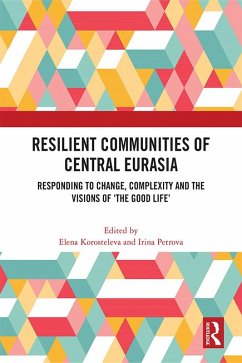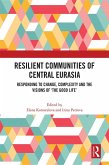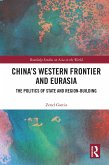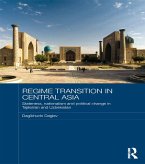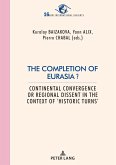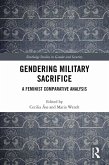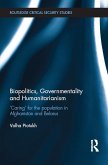Resilient Communities of Central Eurasia (eBook, PDF)
Responding to Change, Complexity and the Visions of 'The Good Life'
Redaktion: Korosteleva, Elena; Petrova, Irina
41,95 €
41,95 €
inkl. MwSt.
Sofort per Download lieferbar

21 °P sammeln
41,95 €
Als Download kaufen

41,95 €
inkl. MwSt.
Sofort per Download lieferbar

21 °P sammeln
Jetzt verschenken
Alle Infos zum eBook verschenken
41,95 €
inkl. MwSt.
Sofort per Download lieferbar
Alle Infos zum eBook verschenken

21 °P sammeln
Resilient Communities of Central Eurasia (eBook, PDF)
Responding to Change, Complexity and the Visions of 'The Good Life'
Redaktion: Korosteleva, Elena; Petrova, Irina
- Format: PDF
- Merkliste
- Auf die Merkliste
- Bewerten Bewerten
- Teilen
- Produkt teilen
- Produkterinnerung
- Produkterinnerung

Bitte loggen Sie sich zunächst in Ihr Kundenkonto ein oder registrieren Sie sich bei
bücher.de, um das eBook-Abo tolino select nutzen zu können.
Hier können Sie sich einloggen
Hier können Sie sich einloggen
Sie sind bereits eingeloggt. Klicken Sie auf 2. tolino select Abo, um fortzufahren.

Bitte loggen Sie sich zunächst in Ihr Kundenkonto ein oder registrieren Sie sich bei bücher.de, um das eBook-Abo tolino select nutzen zu können.
This book argues for the need to rethink governance through the lens of 'resilience as self-governance'. This book will be of great value to students and scholars in the fields of Politics including Eurasian politics and the various aspects of Governance.
- Geräte: PC
- ohne Kopierschutz
- eBook Hilfe
- Größe: 6.22MB
Andere Kunden interessierten sich auch für
![Resilient Communities of Central Eurasia (eBook, ePUB) Resilient Communities of Central Eurasia (eBook, ePUB)]() Resilient Communities of Central Eurasia (eBook, ePUB)41,95 €
Resilient Communities of Central Eurasia (eBook, ePUB)41,95 €![China's Western Frontier and Eurasia (eBook, PDF) China's Western Frontier and Eurasia (eBook, PDF)]() Zenel GarciaChina's Western Frontier and Eurasia (eBook, PDF)43,95 €
Zenel GarciaChina's Western Frontier and Eurasia (eBook, PDF)43,95 €![Regime Transition in Central Asia (eBook, PDF) Regime Transition in Central Asia (eBook, PDF)]() Dagikhudo DagievRegime Transition in Central Asia (eBook, PDF)45,95 €
Dagikhudo DagievRegime Transition in Central Asia (eBook, PDF)45,95 €![India and Central Asia in the Post-Cold War Era (eBook, PDF) India and Central Asia in the Post-Cold War Era (eBook, PDF)]() Saroj Kumar AryalIndia and Central Asia in the Post-Cold War Era (eBook, PDF)41,95 €
Saroj Kumar AryalIndia and Central Asia in the Post-Cold War Era (eBook, PDF)41,95 €- -6%11
![The Completion of Eurasia ? (eBook, PDF) The Completion of Eurasia ? (eBook, PDF)]() The Completion of Eurasia ? (eBook, PDF)64,95 €
The Completion of Eurasia ? (eBook, PDF)64,95 € ![Gendering Military Sacrifice (eBook, PDF) Gendering Military Sacrifice (eBook, PDF)]() Gendering Military Sacrifice (eBook, PDF)43,95 €
Gendering Military Sacrifice (eBook, PDF)43,95 €![Biopolitics, Governmentality and Humanitarianism (eBook, PDF) Biopolitics, Governmentality and Humanitarianism (eBook, PDF)]() Volha PiotukhBiopolitics, Governmentality and Humanitarianism (eBook, PDF)41,95 €
Volha PiotukhBiopolitics, Governmentality and Humanitarianism (eBook, PDF)41,95 €-
-
-
This book argues for the need to rethink governance through the lens of 'resilience as self-governance'. This book will be of great value to students and scholars in the fields of Politics including Eurasian politics and the various aspects of Governance.
Dieser Download kann aus rechtlichen Gründen nur mit Rechnungsadresse in A, B, BG, CY, CZ, D, DK, EW, E, FIN, F, GR, HR, H, IRL, I, LT, L, LR, M, NL, PL, P, R, S, SLO, SK ausgeliefert werden.
Produktdetails
- Produktdetails
- Verlag: Taylor & Francis
- Seitenzahl: 208
- Erscheinungstermin: 21. März 2023
- Englisch
- ISBN-13: 9781000793109
- Artikelnr.: 67344911
- Verlag: Taylor & Francis
- Seitenzahl: 208
- Erscheinungstermin: 21. März 2023
- Englisch
- ISBN-13: 9781000793109
- Artikelnr.: 67344911
- Herstellerkennzeichnung Die Herstellerinformationen sind derzeit nicht verfügbar.
Elena Korosteleva is Professor of Politics and Global Sustainable Development, and Director of the Institute for Global Sustainable Development, at the University of Warwick. Elena is formerly Principal Investigator for GCRF-funded project COMPASS (ES/P010849/1, 2017-22) and Co-Founder/Investigator for the Oxford Belarus Observatory (2020-22), University of Oxford. Her interests include resilience, complexity-thinking, order formation and multi-order governance in Central Eurasia. Her recent publications are Belarus in XXI Century: Between Dictatorship and Democracy (with I. Petrova and A. Kudlenko, Routledge 2022, forthcoming), 'The War in Ukraine: Putin and the Multi-order World', Contemporary Security Policy, 43(3) 2022: 466-81 (with T. Flockhart); and Resilience in EU and International Institutions (with T. Flockhart, Routledge 2020). Irina Petrova is Assistant Professor in the Politics of Eurasia at the UCL School of Slavonic and East European Studies (SSEES). Her recent publications include 'Community Resilience in Belarus and the EU response' in Journal of Common Market Studies Annual Review, October 2021 (with E. Korosteleva); 'Societal fragilities and resilience: The emergence of peoplehood in Belarus' (with E. Korosteleva), August 2021 in the Journal of Eurasian Studies; and 'From "the global" to "the local": the future of cooperative orders in Central Eurasia in times of complexity' (with E. Korosteleva), International Politics 58(3) 2021.
Introduction: What makes communities resilient in times of complexity and
change? 1. Decolonising resilience: reading Glissant's Poetics of Relation
in Central Eurasia 2. From 'Westlessness' to renewal of the liberal
international order: whose vision for the 'good life' will matter? 3.
Encountering the Complexity of Global Life 4. 'Imitated' or genuine? The
value of resilience in Sufi-hamsoya 5. Communal self-governance as an
alternative to neoliberal governance: proposing a post-development approach
to EU resilience-building in Central Asia 6. Belarus between West and East:
experience of social integration via inclusive resilience 7. The
Azerbaijani resilient society: explaining the multifaceted aspects of
people's social solidarity 8. Community resilience and social capital in
post-Soviet mono-industrial areas affected by the uranium legacy and
radiation: evidence from Kyrgyzstan Conclusion Locating Central Eurasia's
inherent resilience
change? 1. Decolonising resilience: reading Glissant's Poetics of Relation
in Central Eurasia 2. From 'Westlessness' to renewal of the liberal
international order: whose vision for the 'good life' will matter? 3.
Encountering the Complexity of Global Life 4. 'Imitated' or genuine? The
value of resilience in Sufi-hamsoya 5. Communal self-governance as an
alternative to neoliberal governance: proposing a post-development approach
to EU resilience-building in Central Asia 6. Belarus between West and East:
experience of social integration via inclusive resilience 7. The
Azerbaijani resilient society: explaining the multifaceted aspects of
people's social solidarity 8. Community resilience and social capital in
post-Soviet mono-industrial areas affected by the uranium legacy and
radiation: evidence from Kyrgyzstan Conclusion Locating Central Eurasia's
inherent resilience
Introduction: What makes communities resilient in times of complexity and
change? 1. Decolonising resilience: reading Glissant's Poetics of Relation
in Central Eurasia 2. From 'Westlessness' to renewal of the liberal
international order: whose vision for the 'good life' will matter? 3.
Encountering the Complexity of Global Life 4. 'Imitated' or genuine? The
value of resilience in Sufi-hamsoya 5. Communal self-governance as an
alternative to neoliberal governance: proposing a post-development approach
to EU resilience-building in Central Asia 6. Belarus between West and East:
experience of social integration via inclusive resilience 7. The
Azerbaijani resilient society: explaining the multifaceted aspects of
people's social solidarity 8. Community resilience and social capital in
post-Soviet mono-industrial areas affected by the uranium legacy and
radiation: evidence from Kyrgyzstan Conclusion Locating Central Eurasia's
inherent resilience
change? 1. Decolonising resilience: reading Glissant's Poetics of Relation
in Central Eurasia 2. From 'Westlessness' to renewal of the liberal
international order: whose vision for the 'good life' will matter? 3.
Encountering the Complexity of Global Life 4. 'Imitated' or genuine? The
value of resilience in Sufi-hamsoya 5. Communal self-governance as an
alternative to neoliberal governance: proposing a post-development approach
to EU resilience-building in Central Asia 6. Belarus between West and East:
experience of social integration via inclusive resilience 7. The
Azerbaijani resilient society: explaining the multifaceted aspects of
people's social solidarity 8. Community resilience and social capital in
post-Soviet mono-industrial areas affected by the uranium legacy and
radiation: evidence from Kyrgyzstan Conclusion Locating Central Eurasia's
inherent resilience
